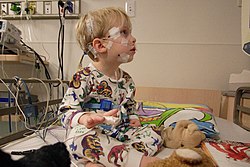Sleep-learning or sleep-teaching (also known as hypnopædia or hypnopedia) is an attempt to convey information to a sleeping person, typically by playing...
12 KB (1,524 words) - 23:34, 1 August 2025
hypotheses explain the possible connections between sleep and learning in humans. Research indicates that sleep does more than allow the brain to rest; it may...
21 KB (2,469 words) - 15:41, 20 July 2025
relationship between sleep and memory has been studied since at least the early 19th century. Memory, the cognitive process of storing and retrieving past...
86 KB (11,419 words) - 15:12, 20 July 2025
Sleep is a state of reduced mental and physical activity in which consciousness is altered and certain sensory activity is inhibited. During sleep, there...
110 KB (12,791 words) - 04:11, 19 July 2025
Sleep deprivation, also known as sleep insufficiency or sleeplessness, is the condition of not having adequate duration and/or quality of sleep to support...
133 KB (14,925 words) - 17:16, 31 July 2025
Sleep paralysis is a state, during waking up or falling asleep, in which a person is conscious but in a complete state of full-body paralysis. During...
48 KB (5,537 words) - 19:59, 30 June 2025
The wake-sleep algorithm is an unsupervised learning algorithm for deep generative models, especially Helmholtz Machines. The algorithm is similar to...
5 KB (540 words) - 02:13, 27 December 2023
rats and dogs. Sleep spindles play a crucial role in declarative memory consolidation and both sex and menstruation affect sleep and online learning periods...
20 KB (2,424 words) - 15:13, 20 July 2025
Rapid eye movement sleep (REM sleep or REMS) is a unique phase of sleep in mammals (including humans) and birds, characterized by random rapid movement...
70 KB (8,508 words) - 18:06, 17 July 2025
Slow-wave sleep (SWS), often referred to as deep sleep, is the third stage of non-rapid eye movement sleep (NREM), where electroencephalography activity...
49 KB (5,690 words) - 08:29, 22 July 2025
Long-term memory (redirect from Sleep and long-term memory)
theories consider sleep to be an important factor in establishing well-organized long-term memories. (See also sleep and learning.) Sleep plays a key function...
55 KB (7,012 words) - 21:04, 22 July 2025
Procedural memory (redirect from Procedural learning)
Smith, C; Fazekas, A (1997). "Amount of REM sleep and Stage 2 sleep required for efficient learning". Sleep Res. 26: 690. Smith, C; Weeden, K (1990). "Post...
79 KB (9,803 words) - 20:20, 30 June 2025
majority of studies on sleep creativity have shown that sleep can facilitate insightful behavior and flexible reasoning, and there are several hypotheses...
14 KB (1,971 words) - 15:12, 20 July 2025
Robert Stickgold (category Sleep researchers)
Medical School and the Beth Israel Deaconess Medical Center. A sleep researcher, his work focuses on the relationship between sleep and learning. Stickgold's...
5 KB (412 words) - 15:40, 18 July 2025
Polyphasic sleep or segmented sleep is the system of sleeping during multiple periods over the course of 24 hours, in contrast to monophasic sleep, a single...
28 KB (3,086 words) - 13:57, 1 August 2025
Learning theory attempts to describe how students receive, process, and retain knowledge during learning. Cognitive, emotional, and environmental influences...
52 KB (6,596 words) - 13:16, 19 June 2025
Insomnia (redirect from Sleep drug)
behaviors to improve sleep quality and consolidation. Behavioral therapy may include learning healthy sleep habits to promote sleep relaxation, undergoing...
127 KB (13,977 words) - 06:08, 6 August 2025
Non-24-hour sleep–wake disorder (non-24, N24SWD, or N24) is one of several chronic circadian rhythm sleep disorders (CRSDs). It is defined as a "chronic...
52 KB (6,326 words) - 09:14, 7 August 2025
Sleep medicine is a medical specialty or subspecialty devoted to the diagnosis and therapy of sleep disturbances and disorders. From the middle of the...
49 KB (5,731 words) - 16:38, 19 July 2025
Night terror (redirect from Sleep terror disorder)
Night terror, also called sleep terror, is a sleep disorder causing feelings of panic or dread and typically occurring during the first hours of stage...
30 KB (3,453 words) - 22:03, 15 July 2025
basal species do not sleep, since they do not have brains. It has been observed in mammals, birds, reptiles, amphibians, fish, and, in some form, in arthropods...
66 KB (7,982 words) - 16:21, 9 August 2025
amount of sleep time is greatly reduced. This imbalance in circadian rhythm can lead to extremely harmful affects on students' learning and memory processes...
44 KB (5,568 words) - 14:54, 2 November 2024
Memory consolidation (section Zif268 and REM sleep)
memories and therefore assist in the learning process. Recent studies have examined the relationship between REM sleep and procedural learning consolidation...
62 KB (7,382 words) - 16:57, 23 July 2025
A sleep disorder, or somnipathy, is a medical disorder affecting an individual's sleep patterns, sometimes impacting physical, mental, social, and emotional...
73 KB (8,555 words) - 06:31, 8 August 2025
In machine learning, deep learning focuses on utilizing multilayered neural networks to perform tasks such as classification, regression, and representation...
183 KB (18,114 words) - 23:26, 2 August 2025
Mouth breathing (category Symptoms and signs: Respiratory system)
about 85% of cases, it is an adaptation to nasal congestion, and frequently occurs during sleep. More specialized causes include: antrochoanal polyps; a short...
20 KB (1,831 words) - 14:48, 6 August 2025
Andrei Tarkovsky (category Academic staff of High Courses for Scriptwriters and Film Directors)
Ceylan on 'Winter Sleep' and Learning to Love Boring Movies". Variety. Retrieved 24 April 2022. "Michael Haneke". BFI Film Forever. Sight and Sound. Archived...
85 KB (9,099 words) - 06:55, 4 August 2025
movement sleep (NREM), also known as quiescent sleep, is, collectively, sleep stages 1–3, previously known as stages 1–4. Rapid eye movement sleep (REM)...
38 KB (4,724 words) - 21:41, 22 July 2025
sleep breaks, often aided by technology and ambient features. Nap pods have emerged in corporate environments, hospitals, universities, airports and other...
9 KB (1,069 words) - 17:12, 4 August 2025
neuroscience of sleep is the study of the neuroscientific and physiological basis of the nature of sleep and its functions. Traditionally, sleep has been studied...
124 KB (15,773 words) - 06:40, 19 July 2025


















